
What's the difference between have to, supposed to and ought to?
When you must do something, you have to do it. It is used for a situation that has no choice. Have to is used for obligations.
"Students must wear their uniforms to school or they will be sent home."
"In England, you have to drive on the left."

When we rub someone up the wrong way, we annoy, anger or irritate them. When people rub us up the wrong way, they usually do not know they are doing something wrong.
"My young brother rubs me up the wrong way. He is so annoying."
"The way he talks really rubs me up the wrong way."
When we hear the word like we think about things we enjoy, "I like English." There are other uses of the word. How familiar are you with these?
"What's she like?" - 'What...like?' is used when asking about someone's personality or character. You could answer with:
She is funny/patient/outgoing.
Have you ever felt that someone is telling you something that is not true? Perhaps they are trying to lie to you. In that case, you smell a rat!
When we feel that something someone or something is not honest, we smell a rat.
"I smell a rat. If John was off from work all week because he was sick, why has he got a suntan?"
We use use much and many in questions and negative sentences. They both show an amount of something.
We use much with singular nouns.
Question: "How much petrol is in the car?"
Negative clause: "We don't have much time left."
What's wrong with this sentence?
"Boy played in the park."
The problem is that the noun 'boy' (the subjects) cannot be used without an article. We could say, for example, 'The boy', 'A boy' or 'My neighbour's boy'. Generally, the articles a and the are used with nouns.
Use the before singular and plural nouns when the noun is specific.
Native speakers usually use contractions especially when speaking. We make contractions by connecting two or more words together. One or more letters are removed from the words when they are connected.
I am → I'm →"I'm older than you."
I had →I'd → "I'd better do my homework."
I have → I've → "I've always liked sushi."
Let's take a look at a couple of words that are often confused by English learners, alone and lonely.
If you are sitting in a room and there are no other people in the room, you are alone. Alone simply means without other people.
"I used to live with my parents, now I live alone."
On Wednesday, Google finally _1_ its latest much-talked about product, 'Google Glass'.
A while ago we looked at how to use look, see and watch; today we at two other verbs connected to our senses: hear and listen.
We use hear for sounds that come to us when we are not expecting to hear them, i.e. we are not trying to hear something. We hear something without trying to.